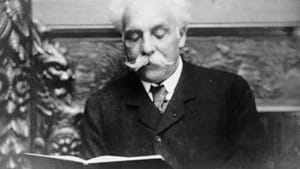Stay in the Loop
BSR publishes on a weekly schedule, with an email newsletter every Wednesday and Thursday morning. There’s no paywall, and subscribing is always free.
The Ludwig-Fauré-Bach connection
The Variation String Trio debuts a David Ludwig fantasy

In his introductory comments on the Philadelphia premiere of his Aria Fantasy, David Ludwig joked that “fantasy” is a term composers use when they can’t think of anything else. In this case, Ludwig applied it to a group of sections “inspired” (his word) by phrases from different sections of the aria that Bach ran through 30 variations in his Goldberg Variations. Ludwig also sees the fantasy as a night piece “which drifts in and out of states of waking dreams” — a conception that links it to the (probably apocryphal) story that the Goldberg Variations were commissioned by an insomniac aristocrat who wanted music that would help him sleep.
That may sound esoteric and academic, but the Aria Fantasy is, in fact, a lively, sometimes rousing piece by one of the most popular composers currently living in the Philadelphia area. It’s composed for piano and string trio, and it includes some wild, jazzy passages, moments when a whirlwind of strings surrounds a big bang from the piano, and gentler interludes like the moments when the piano simulates a tinkling bell.
The Variation String Trio presented the premiere as part of their first appearance on the Philadelphia Chamber Music Society calendar, with the redoubtable Natalie Zhu as their guest pianist. They teamed it with one of the masterpieces for the same instrumental combination, Gabriel Fauré’s Piano Quartet in G Minor.
One of the attractions of the classical musical tradition is the pleasure of discovery. In addition to encounters with new pieces like Ludwig’s, the tradition offers its devotees a library stocked with 600 years of scores — a treasure house that can support lifetimes of exploration. In the last few years, Fauré has gradually become one of my favorite composers. His work combines the French fondness for tone color with a strong sense of form. Emotionally, it’s deep but restrained, like most of the writers I like.
Veterans amongst the Variations
The G Minor quartet is one of the best examples of Fauré’s virtues, and the Variations and their guest gave it the treatment it deserves. The Variation Trio may have been making its debut with the PCMS, but its individual members are all busy veteran musicians with strong Philadelphia links. Violinist Jennifer Koh has become a leading exponent of new music. Cellist Wilhelmina Smith made a lasting impression on local audiences during the days when the Chamber Orchestra of Philadelphia was known as the Concerto Soloists. Violist Hsin-Yun Huang has been building an international career since she won her first competition in 1988, and her current activities include her work as the founder of the Sejong International Music Festival, a double event that takes place in Sejong, South Korea in February and Philadelphia, at the Curtis Institute, in the summer.
Any concert that includes Natalie Zhu is going to leave the audience shaking their heads in awe. Her remarkable hands once again proved they can deliver the exact volume and tempo a musical passage requires, whether it’s suggestively quiet or loud and rollicking. But there was never any danger she would upstage the three strings. Their wealth of talent and experience could be heard from the moment Jennifer Koh launched into the first big moment for the violin in the Beethoven trio that opened the concert. The final movement of the Fauré ended the evening with all four instruments going full blast, fully blended into a complex texture as each voice went its own way.
What, When, Where
Philadelphia Chamber Music Society, Variation String Trio: Beethoven, String Trio in G Major. Ludwig, Aria Fantasy. Fauré, Piano Quartet in G Minor. Variation String Trio: Jennifer Koh, violin; Hsin-Yun Huang, viola; Wilhelmina Smith, cello. Guest artist: Natalie Zhu, piano.
November 25, 2014 at Benjamin Franklin Hall, American Philosophical Society, 427 Chestnut Street, Philadelphia. 215-569-8080 or www.pcmsconcerts.org.
Sign up for our newsletter
All of the week's new articles, all in one place. Sign up for the free weekly BSR newsletters, and don't miss a conversation.

 Tom Purdom
Tom Purdom